 Petzlover
Petzlover Ciobanesc de Bucovina is originated from Romania but Slovakian Hound is originated from Slovakia. Ciobanesc de Bucovina may grow 31 cm / 13 inches higher than Slovakian Hound. Ciobanesc de Bucovina may weigh 73 kg / 161 pounds more than Slovakian Hound. Both Ciobanesc de Bucovina and Slovakian Hound has almost same life span. Both Ciobanesc de Bucovina and Slovakian Hound has same litter size. Ciobanesc de Bucovina requires High Maintenance. But Slovakian Hound requires Low Maintenance
Ciobanesc de Bucovina is originated from Romania but Slovakian Hound is originated from Slovakia. Ciobanesc de Bucovina may grow 31 cm / 13 inches higher than Slovakian Hound. Ciobanesc de Bucovina may weigh 73 kg / 161 pounds more than Slovakian Hound. Both Ciobanesc de Bucovina and Slovakian Hound has almost same life span. Both Ciobanesc de Bucovina and Slovakian Hound has same litter size. Ciobanesc de Bucovina requires High Maintenance. But Slovakian Hound requires Low Maintenance
 The Ciobanesc de Bucovina is a breed that developed naturally in the Carpathian Mountains (Romania and Serbia) and some regions of Bulgaria. The breed was especially useful in the Romanian northeast regions, the county Bucovina and in the northeastern region of Serbia. These dogs are bred for guarding and herding of flocks as well as guard dogs for the family home.
The Ciobanesc de Bucovina is a breed that developed naturally in the Carpathian Mountains (Romania and Serbia) and some regions of Bulgaria. The breed was especially useful in the Romanian northeast regions, the county Bucovina and in the northeastern region of Serbia. These dogs are bred for guarding and herding of flocks as well as guard dogs for the family home.
When the area was split between Russian and Romania, the dog continued to thrive in the mountains because of the need that the shepherds had for this type of dog with the build, working ability and temperament of the Bucovina.
Finally, in the 20th century, Romania began to urbanize and industrialize. People moved to the cities from the hills and many brought their dogs with them. This allowed many non-mountain Romanians to come into contact with the Bucovina Shepherd for the first time. He became a great family dog and offered guard dog protection as well.
The Romanian Kennel Club accepted the Ciobanesc du Bucovina in 1982 and wrote the first standard then. It has since been updated in 2001 and 2002 with today’s standard. They are not accepted by the international clubs nor the big clubs in the US and Europe. This is one factor in keeping the breed rare because it is little known outside of Romania.
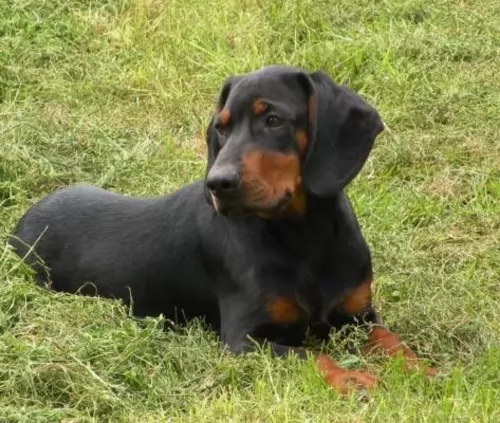 The Slovakian Hound is also known as the Slovenský Kopov or the Black Forest Hound. This is a scenthound which comes from Slovakia in Central Europe and has been bred for boar hunting.
The Slovakian Hound is also known as the Slovenský Kopov or the Black Forest Hound. This is a scenthound which comes from Slovakia in Central Europe and has been bred for boar hunting.
The breed was first recognized in the 1870s, with dogs such as the Austrian Black and Tan Hound as well as the Hungarian Greyhound being thought to be part of dogs ancestry. The breed club was established in 1988 and is recognized by the FCI.
 Most large mountain dogs resemble the Bucovina Shepherd, but this breed is more slightly built and has a lighter coat than most of the mountain dogs. They are still a very large dog weighing in between 70 and 120 pounds. They are powerfully built even if more slender than other mountain dogs. They have a long thick coat that makes it difficult to see how their bodies are formed, but they are a very muscular dog.
Most large mountain dogs resemble the Bucovina Shepherd, but this breed is more slightly built and has a lighter coat than most of the mountain dogs. They are still a very large dog weighing in between 70 and 120 pounds. They are powerfully built even if more slender than other mountain dogs. They have a long thick coat that makes it difficult to see how their bodies are formed, but they are a very muscular dog.
Their large head does indicate how powerful a dog he is, and he has a wide muzzle that tapers off at the end. The breed has small eyes that are either hazel or brown and his v-shaped ears hang downward on the side of his head. He has a wide, black nose and thick, dark lips. His tail is bushy and long.
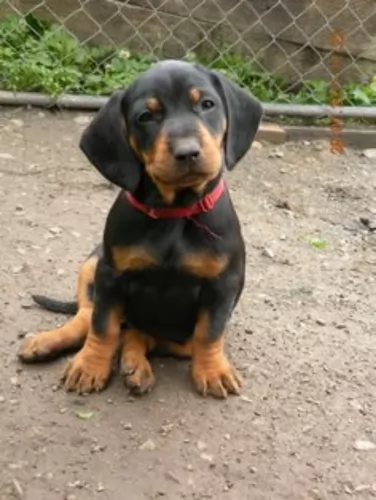 The Slovakian Hound is a muscular dog of medium height and with a long tail and long drop ears. The short coat is always black with tan markings.
The Slovakian Hound is a muscular dog of medium height and with a long tail and long drop ears. The short coat is always black with tan markings.
These compact looking dogs stand in height at about 43 to 47cm and weigh in the region of 14 to 17kg. The face is friendly and the eyes alert and bright.
Independent and intelligent, the Solvakian Hound will learn some basic commands easily. He is adaptable and will fit into life in the countryside as well as the city, so long as he is well exercised.
He is a sociable, playful dog and will do well with children, particularly if he has been trained and socialized. He is also a good choice for the first-time dog owner. He is alert and makes a good watchdog too.
 Bred to herd and guard cattle against the wolves and bears, it is a very dominant, self-assured, breed. They are intelligent yet laid back when no threat is suspected. They love children but can be hard to train. A dominant adult is needed to train and control the Ciobanesc de Bucovina. They are quite protective of their families and will patrol the property if left outside at night.
Bred to herd and guard cattle against the wolves and bears, it is a very dominant, self-assured, breed. They are intelligent yet laid back when no threat is suspected. They love children but can be hard to train. A dominant adult is needed to train and control the Ciobanesc de Bucovina. They are quite protective of their families and will patrol the property if left outside at night.
The breed has a strong mistrust of strangers but loves his adopted family. Unless threatened the Ciobanesc de Bucovina is calm and chilled. He is loyal, affectionate and dedicated. They attempt to frighten strangers with barks and growls but will attack if necessary. They are also very driven to chase prey so make sure they are in a locked fence. They can be difficult to train and seem to need a strong, alpha adult presence.
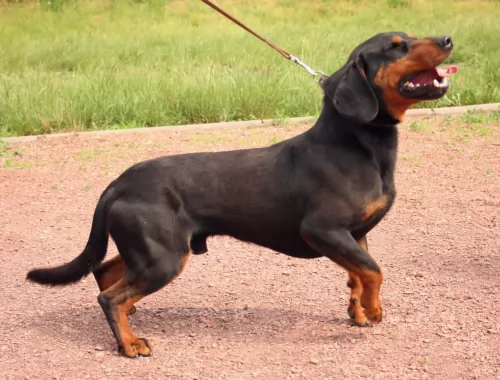 His job as a hunting dog has meant that the Slovakian Hound is a brave, energetic, determined dog.
His job as a hunting dog has meant that the Slovakian Hound is a brave, energetic, determined dog.
As a pet and companion, you won’t be disappointed as he puts as much effort into his relationships with his human family as he does with hunting.
This amicable dog makes a wonderfully loyal and devoted pet, companion and guard dog.
 Not much has been done to study the health of this breed so not much is known for certain. It is known that they have good health as they have survived the harsh winters in the mountains while tending to the flocks.
Not much has been done to study the health of this breed so not much is known for certain. It is known that they have good health as they have survived the harsh winters in the mountains while tending to the flocks.
Given their size and the history of mountain dogs, they could be susceptible to visual and skeletal amount of food and at the right times can prevent this. They could be susceptible to arthritis, knee and elbow dysplasia, and cataracts.
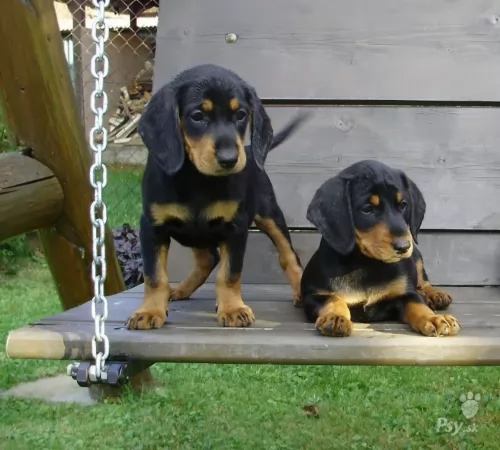 Most dogs at some or other time will be faced with a particular health challenge. Most times the veterinarian can fix these problems with the right kind of treatment.
Most dogs at some or other time will be faced with a particular health challenge. Most times the veterinarian can fix these problems with the right kind of treatment.
The Slovakian Hound is a healthy dog breed and you aren’t likely to come up with too many problems, though it it wise to be aware of some of the more common dog illnesses there are -
This is something you can expect as your Slovakian Hound ages. It is brought on by tissue degeneration. With eyes, dogs can develop cataracts. With his ears, consistently cleaning and watching out for ear infections can also help with slowing down hearing loss.
Apart from hip dysplasia which can start with even very young dogs, osteoarthritis can cause joint pain and stiffness of joints. It’s a degenerative disease, but fortunately there are a number of treatments to alleviate pain. Remember that nutrition plays a huge role in reducing joint problems in dogs.
Cancer is also a disease that has no respect for the age of the dog or dog breed. When you brush your pet, feel for any unusual lumps. Not all lumps are cancerous but it will be a good idea to have your pet checked over by the vet.
 It is important not to over feed or to feed to much at one time. Even though they are large and powerful dogs, massive meals can cause bloat, so you are better off with 2-4 smaller meals per day. Also, don’t feed right before or right after strenuous exercise.
It is important not to over feed or to feed to much at one time. Even though they are large and powerful dogs, massive meals can cause bloat, so you are better off with 2-4 smaller meals per day. Also, don’t feed right before or right after strenuous exercise.
As previously mentioned this breed does not appear to have many health issues. As they developed naturally in the mountains they have not been exposed to many things there.
This was already mentioned but it is a very serious condition and requires veterinary assistance immediately under threat of death.
They can have either hip or elbow dysplasia. Can lead to arthritis of lameness.
This is a calm, even tempered dog not needing a lot of exercise. However, he is a big dog and can get obese without daily exercise. A large fenced in yard would be appreciated and a nice brisk walk every day. They would probably enjoy flyball and leurcatch. Any herding or hunting would be enjoyed.
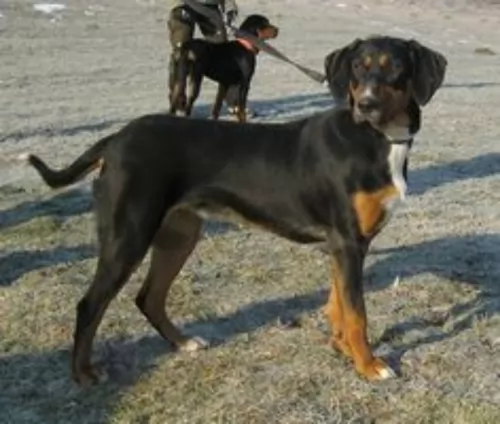 ● Like every other dog, the Slovakian Hound will need exercise if he is to remain healthy and fit. There are lots of back-yard games for dogs such as hide and seek and ball and rope games. He will also love a daily walk.
● Like every other dog, the Slovakian Hound will need exercise if he is to remain healthy and fit. There are lots of back-yard games for dogs such as hide and seek and ball and rope games. He will also love a daily walk.
● Always provide your dog with the best food there is as this encourages good health. Your Slovakian Hound requires top quality food, and while there are some good commercially manufactured foods on the market, it is important to choose the high quality ones that have natural, good ingredients in them.
Try to include some home-made food for him which can be simply mixed into the dry kibble twice a week. Boiled chicken, brown rice or pasta and spinach, sweet potatoes and carrots is super tasty and nutritious. Also try to include some raw meat into the diet occasionally as this helps with preventing skin diseases.
● Trim your Slovakian Hound's nails and check his eyes and ears for infection. The inside of the ears shouldn’t be red and the eyes should be clear and bright. If he will allow you to, check inside his mouth too to make sure there are no bad teeth.
● Don’t allow your dog to have puppies. There are so many unwanted puppies all over the world. Rather have him or her spayed or neutered to avoid puppies that nobody wants. It is beneficial for his health too.